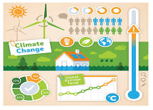i INP-WEALTHPK
Faiza Tehseen
There is a pressing need for establishing a centralised national climate action databank in Pakistan to help the country cope with adverse effects of climate change on various socioeconomic sectors.

“To monitor the weather patterns, water resources, heat-trapping greenhouse gas (GHG) emissions, stemming biodiversity loss and conservation of natural resources, the country is direly in need of such a mechanism,” stresses Muhammad Saleem, spokesman of the climate change and environmental coordination ministry. Talking exclusively to WealthPK, he said the critical evidence-based information is crucial for proper decision-making and result-oriented actions for climate resilience through adaptation and mitigation efforts. The ministry official cautioned that without proper data, “our climate response will remain scrappy and reactive rather than proactive to avoid socio-economic losses from exacerbating and intensifying disasters caused due to shifting weather patterns.” “Data is the backbone of effective and evidence-based climate action. However, a streamlined data availability covering the entire country will benefit the government agencies, research institutes and private entities involved in planning, designing and implementing climate resilience projects,” Saleem stressed. The ministry official said: “Data standardisation across various sectors will help Pakistan enhance regional cooperation on common climate issues.
But the development of a robust system with smart data storage, real-time analytics and AI capabilities requires a significant investment.” “Nevertheless, despite all these hurdles, climate data collection and analysis are long-term future investments. So, Pakistan has to work with other countries toward this goal,” Saleem underscored. He said that besides establishing a local databank, Pakistan was also committed to sharing its efforts to form a regional climate action databank in collaboration with the vulnerable 20 (V20) countries, which are highly susceptible to climate change impacts. “Many V20 nations face rising sea levels, extreme weather events and rapid environmental degradation threatening their socioeconomic set-ups, infrastructure and population.” For V20 countries, the ministry official said databank was inevitable as a reliable data was to strengthen climate resilience strategies and leverage international funding from different channels – Green Climate Fund, Adaptation Fund, Loss and Damage Fund, Asian Development Bank, World Bank and International Monetary Fund.
“The data consolidation will help cope with climate risks, resilience building, and monitor the economic losses,” explained the climate change and environmental coordination ministry official. Talking to WealthPK, Muhammad Saleh Mangrio, Executive Director of Centre for Rural Change, Sindh, said: “To track progress and for proactive decision making to cope with the climatic impacts, a comprehensive climate action databank was crucial to be established in Pakistan.” He said that floods wreaked havoc in the countryside almost every year, especially in areas located near the riverbanks. “Mostly, the communities living near the River Indus are vulnerable to such calamities. So, proper availability of real-time data will help mitigate their suffering.” Mangrio said: “A unified climate databank is important for positive climate action, accountability and transparency, and access to the international climate finance. By doing so, Pakistan can become a climate impact resilient country.”
Credit: INP-WealthPk









